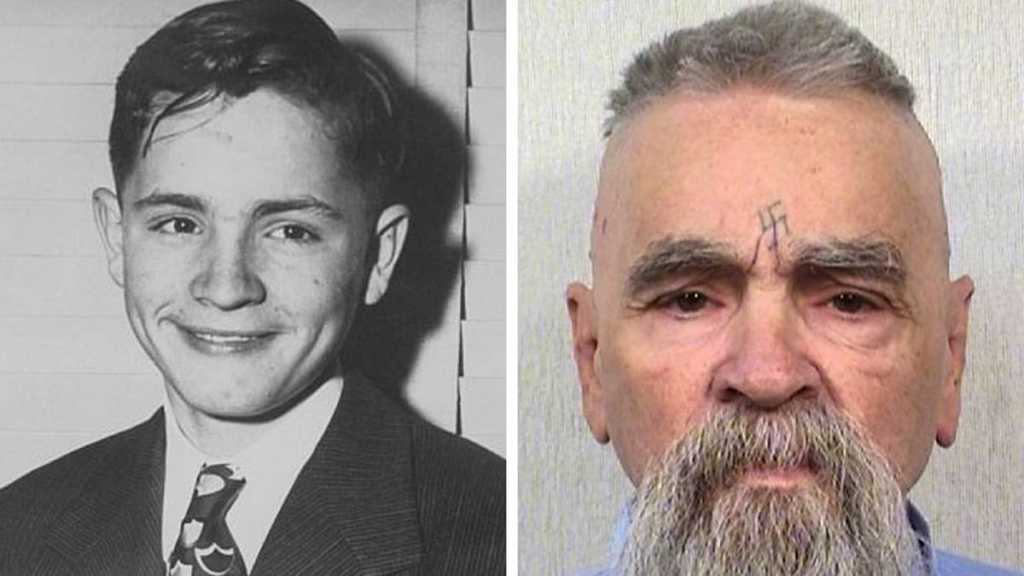The name Charles Luther Manson evokes a chilling reminder of one of the darkest chapters in American history. Manson, a notorious cult leader, orchestrated some of the most infamous murders of the 1960s. His influence over his followers, known as "The Family," led to a series of brutal killings that shocked the nation. As we delve into his life and actions, it becomes clear why Manson remains a figure of fascination and revulsion to this day.
Beyond the sensational headlines and media portrayals, Charles Manson's life was a complex tapestry of manipulation, exploitation, and the darker side of human psychology. His ability to control others, combined with his charisma, created a dangerous cocktail that resulted in tragedy. Understanding his story helps us comprehend the dangers of unchecked power and the vulnerabilities that can lead individuals into destructive paths.
In this article, we will explore Manson's life in detail, from his early years to his infamous reign of terror. By examining his background, motivations, and the impact of his actions, we aim to shed light on the factors that contributed to his rise and fall. This comprehensive exploration is designed to provide valuable insights into the psychology of cult leadership and its consequences.
Read also:Miley Cyrus Mom The Story Of Tish Cyrus Her Legacy And Influence
Biography of Charles Manson
Early Life and Childhood
Charles Luther Manson was born on November 12, 1934, in Cincinnati, Ohio. His early life was marked by instability and hardship, setting the stage for the troubled individual he would become. Raised by a single mother who struggled with alcoholism, Manson experienced a chaotic upbringing that lacked structure and stability. His father, a man he never knew, abandoned the family, leaving Manson to navigate life with little emotional support.
By the age of 13, Manson had already begun a life of crime, engaging in petty theft and other delinquent behaviors. His early brushes with the law led to multiple stints in reform schools, where he continued to exhibit defiant and rebellious tendencies. These formative experiences would shape his worldview and contribute to the person he would later become.
Biographical Data
| Full Name | Charles Luther Manson |
|---|---|
| Birthdate | November 12, 1934 |
| Birthplace | Cincinnati, Ohio, USA |
| Death | November 19, 2017 |
| Occupation | Cult Leader, Criminal |
Rise of The Family
Building a Cult
Manson's rise to infamy began in the late 1960s when he formed a group known as "The Family." This collection of disenchanted individuals, many of them young women, were drawn to Manson's charismatic personality and promises of a better life. Through manipulation and psychological tactics, Manson cultivated a loyal following that would carry out his bidding without question.
Living in a remote ranch in California, The Family became a commune of sorts, isolated from the outside world. Manson used his influence to instill a sense of belonging and purpose among his followers, convincing them that they were part of a greater mission. This mission, however, would soon take a sinister turn.
The Helter Skelter Prophecy
Manson's Vision of Chaos
Central to Manson's ideology was the concept of "Helter Skelter," a term he borrowed from a Beatles song. Manson believed that a race war was imminent and that The Family would emerge victorious, ruling over the chaos that would ensue. To hasten this apocalyptic vision, Manson ordered his followers to commit a series of brutal murders, targeting high-profile individuals.
These murders, including the infamous killing of actress Sharon Tate and six others, were carried out with ruthless precision. The victims were chosen not for personal reasons but to instill fear and provoke societal upheaval. Manson's warped logic and lack of empathy were evident in the callousness of these crimes.
Read also:Meet The Cast Of White Lotus Season 2 A Deeper Dive Into Their Lives And Performances
Psychology of Manipulation
Understanding Manson's Tactics
Manson's ability to manipulate others was a key factor in his success as a cult leader. By exploiting the vulnerabilities of his followers, he was able to exert complete control over their lives. His methods included psychological conditioning, emotional manipulation, and the creation of a dependency on him for guidance and approval.
Studies in psychology have shown that individuals in cults often experience a breakdown of their personal identity, replaced by the identity imposed by the leader. Manson's followers were no exception, as they abandoned their former lives to fully embrace his twisted worldview.
The Trials and Convictions
Justice Served
In 1971, Charles Manson and several members of The Family were brought to trial for the murders they had committed. The trial, which lasted nearly a year, captured the attention of the nation and resulted in guilty verdicts for all defendants. Manson was sentenced to life in prison, where he would remain until his death in 2017.
The trial revealed the full extent of Manson's crimes and the depth of his influence over his followers. Testimonies from survivors and forensic evidence painted a grim picture of the horrors inflicted by The Family. Despite the guilty verdicts, the legacy of Charles Manson continued to loom large in the public consciousness.
Impact on Society
Cultural Significance
Charles Manson's impact on society extends far beyond the immediate aftermath of his crimes. His story has been the subject of numerous books, documentaries, and films, each seeking to understand the mind of a man capable of such atrocities. The fascination with Manson lies in the questions his life raises about human nature, vulnerability, and the dangers of charismatic leadership.
In the years since his death, there has been renewed interest in Manson's life and crimes, with some viewing him as a tragic figure and others as a monster. Regardless of perspective, his legacy serves as a cautionary tale about the dangers of unchecked power and the susceptibility of individuals to manipulation.
Lessons from Manson's Life
Preventing Future Cults
Understanding the factors that contributed to Manson's rise can help prevent similar situations in the future. By examining the psychological and social conditions that allowed The Family to flourish, we can better protect vulnerable individuals from falling prey to dangerous cult leaders.
- Education: Promoting critical thinking and awareness can empower individuals to resist manipulation.
- Community Support: Strong community networks can provide alternatives to those seeking belonging and purpose.
- Legal Protections: Strengthening laws against cult activities can help dismantle dangerous organizations before they cause harm.
Statistical Insights
Data on Cults and Manipulation
According to the International Cultic Studies Association, there are over 5,000 cults operating worldwide, with millions of individuals affected by their activities. Studies show that individuals who join cults often experience significant psychological and emotional distress, with long-term effects that can last for years after leaving.
Research into cult dynamics highlights the importance of early intervention and education in preventing individuals from becoming involved in such groups. By understanding the red flags of manipulative behavior, society can better protect its most vulnerable members.
Public Perception and Media Influence
Shaping the Narrative
The media played a significant role in shaping public perception of Charles Manson and The Family. Sensationalized coverage of their crimes contributed to the mystique surrounding Manson, fueling both fear and fascination. As media consumption continues to evolve, it is crucial to approach such stories with a critical eye, ensuring that facts are presented accurately and responsibly.
Documentaries and films about Manson have sparked debates about the ethics of profiting from true crime stories. While these productions can raise awareness about important issues, they must also be mindful of the impact they have on victims and their families.
Kesimpulan
Charles Luther Manson's life and crimes represent one of the darkest chapters in American history. His ability to manipulate and control others highlights the dangers of unchecked power and the vulnerabilities that can lead individuals into destructive paths. By examining his story, we gain valuable insights into the psychology of cult leadership and its consequences.
As we reflect on Manson's legacy, it is essential to learn from the past and take steps to prevent similar tragedies in the future. Education, community support, and legal protections are key to protecting vulnerable individuals from falling prey to dangerous cult leaders. We invite you to share your thoughts on this article and explore other content on our site that delves into the complexities of human behavior and society.
Table of Contents
- Biography of Charles Manson
- Early Life and Childhood
- Biographical Data
- Rise of The Family
- Building a Cult
- The Helter Skelter Prophecy
- Manson's Vision of Chaos
- Psychology of Manipulation
- Understanding Manson's Tactics
- The Trials and Convictions
- Justice Served
- Impact on Society
- Cultural Significance
- Lessons from Manson's Life
- Preventing Future Cults
- Statistical Insights
- Data on Cults and Manipulation
- Public Perception and Media Influence
- Shaping the Narrative
- Kesimpulan


